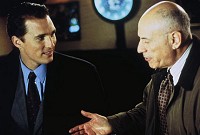
scr Karen Sprecher, Jill Sprecher
with Matthew McConaughey, John Turturro, Alan Arkin, Clea DuVall, Tia Texada, Amy Irving, Frankie Faison, Barbara Sukowa, William Wise, Shawn Elliot, Alex Burns, Rob McElhenney
release US 24.May.02,
UK 17.Jun.05
01/US 1h44

More than a chat: McConaughey and Arkin



 Support Shadows: Buy a Poster
Support Shadows: Buy a Poster
|
 This multi-strand film features New Yorkers grappling with the realities of life and the nature of happiness. It's so packed with intriguing ideas that it's well worth seeing, even if it feels rather clinical and aloof.
This multi-strand film features New Yorkers grappling with the realities of life and the nature of happiness. It's so packed with intriguing ideas that it's well worth seeing, even if it feels rather clinical and aloof.
There are four interlocking strands: A young, triumphant attorney (McConaughey) is brought down to earth by an accident, a bad decision and wracking guilt. A physics professor (Turturro) grows distant from both his wife (Irving) and his mistress (Sukowa) and struggles to be positive about life. A sales manager (Arkin) with personal problems becomes increasingly resentful of the cheerful smiliness of a colleague (Wise) and sets out to test his optimism. And a young cleaning lady (DuVall) with a sense of purpose in life finds her hopefulness shaken after an accident.
The "one thing" seems to be happiness--its elusive, fragile nature and the importance of interconnection with other people. Along the way, the script grapples repeatedly with issues of optimism/pessimism, luck/bitterness, the loss of innocence and discovery of hope, new wounds and healing scars. It's pretty intense stuff, but it's written and acted with a refreshing honesty that keeps us watching, even if we never engage with the characters.
Performances are strong across the board; the actors clearly relish the chance to play complex, introspective characters whose strongest moments are emotionally charged silence. The dialog is probably too clever for its own good, swirling around the issues with razor sharp clarity as scenes echo each other and characters interact without even being in the same plot threads. The chapter headings are all cliches that director-cowriter Sprecher then stands on their heads. The directorial style is slick and luxuriant, but also starkly realistic.
It's an extremely well-made film that gets in there and wrestles with real-life issues in a meaningful way. And yet it's too carefully constructed--out of sequence with a circular structure that keeps coming back on itself. Sprecher vividly engages our minds but fails to deliver even a single punch to the gut. We never really care about these people at all. Even though they're us.
 |
themes, language, drugs, violence | 29.Mar.05 |

 Still waiting for your comments ... don't be shy.
Still waiting for your comments ... don't be shy.
HOME | REVIEWS | NEWS | FESTIVAL | AWARDS | Q&A | ABOUT | TALKBACK